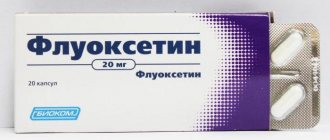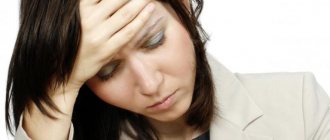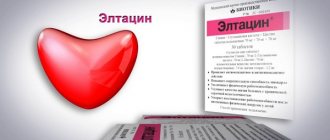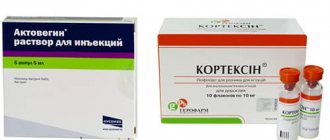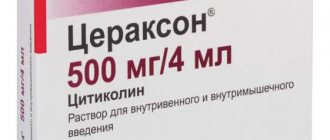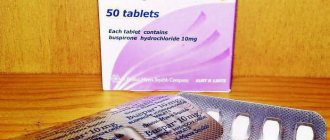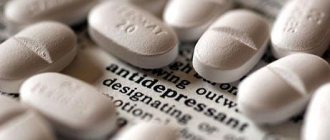To treat diseases of the central nervous system, the consequences of a stroke or traumatic brain injury, neurologists at the Yusupov Hospital use the modern nootropic drug gliatilin. Reviews from doctors and patients about the drug are positive. Doctors at the Yusupov Hospital prescribe gliatilin after a comprehensive examination of patients using modern diagnostic equipment from leading European and American companies.
All severe cases of diseases in which there is a need to prescribe gliatilin are discussed at a meeting of the Expert Council with the participation of professors and doctors of the highest category. Leading neurologists collectively decide on the choice of dose, route of administration of the drug and duration of the therapeutic course individually for each patient. The forums contain information that you can lose weight when taking gliatilin, reviews of people taking the drug to lose weight. Gliatilin does not affect lipid metabolism and is classified as a weight loss product. This is a drug that has a pronounced complex effect on the central and peripheral nervous system. It can be used according to indications under the supervision of a physician.
Release form, composition of the drug
Gliatilin is available in oval, yellow, opaque soft gelatin capsules that contain a viscous, colorless solution. One capsule contains 400 mg of the main active ingredient choline alfoscerate and auxiliary components: glycerol, purified water. The capsule shell consists of the following ingredients:
- Gelatin;
- Esitol;
- Sorbitan;
- Sodium ethyl parahydroxybenzoate;
- Sodium propyl parahydroxybenzoate;
- Titanium dioxide;
- Iron (III) metahydroxide.
A blister with fourteen capsules and instructions for use is placed in a cardboard box. The price of the drug and reviews about it are available on the Internet.
Gliatilin in ampoules is a transparent, colorless and odorless solution for intravenous and intramuscular administration. One ampoule has a volume of 1 ml. One milliliter of solution contains 250 mg of choline alfoscerate. 3 ampoules of colorless glass with a volume of 4 ml are placed in a blister contour packaging. The cardboard box contains 1 contour package and instructions for use of the drug Gliatilin. Reviews can be read on medical forums.
Gliatilin – restoration of brain functions after a stroke
In the last decade, there has been an increase in strokes in patients of different age categories. WHO forecasts are not reassuring, as they only assume a further increase.
This is due to the fact that risk factors increase, such as diabetes, obesity, smoking, hypertension and cardiovascular diseases. Stroke leads in the number of deaths and disability. Only 20 percent of people return to work after a stroke; 25 percent of the population become disabled as a result of a stroke.
The urgency of the problem requires new solutions and modern rehabilitation of patients who have suffered a cerebral stroke.
Problems and goals of post-stroke rehabilitation
The main tasks in the recovery of post-stroke patients are: 1. Restoration of functions impaired by a stroke. 2. Readaptation of patients, both mental and social. 3. Prevention of complications. 4. Prevention of recurrent stroke.
The success of rehabilitation is determined by the following factors: • early start of rehabilitation actions; • active participation of the patient himself; • complicity of the patient's relatives and friends; • systematic; • complexity; • phasing.
The patient's recovery rate is influenced by many conditions: • the patient's age; • timely provision of medical care; • quality of medical care; • localization of lesions; • accompanying illnesses; • severity of stroke.
Cognitive impairment is considered the main obstacle in the rehabilitation of post-stroke patients. These are post-stroke pathologies of memory and other higher brain functions. Cognitive disorders have a negative impact on rehabilitation, significantly worsening the quality of life of both the patient and his family.
Neuroprotectors for stroke
The main goal in rehabilitation therapy is to restore the options of the central nervous system.
During the period of formed morphological infarct changes in the brain substance, reparative therapy using medications that can improve the plasticity of undamaged brain cells and improve interneuronal interaction is of great importance.
These drugs include neuroprotectors. These drugs are capable of: 1. Strengthening regenerative and reparative processes that contribute to the restoration of impaired functions. 2. Activate brain structures. 3. Improve memory. 4. Restore cognitive functions. 5. Increase the resistance of the central nervous system to damaging influences.
Neuroprotectors have trophic and modulatory properties. The positive effect of the use of these drugs on the period of post-stroke rehabilitation has been proven.
One of the most effective drugs among neuroprotectors is Gliatilin.
Gliatilin is a compound consisting of 40% choline, which in the body is converted into the metabolically active form of phosphorylcholine, which can activate the biosynthesis of acetylcholine in cholinergic neurons.
Neurologists recommend buying Gliatilin capsules, since the drug has the following functions: • prevents induced cholinergic deficiency; • prevents dementia from developing; • improves learning ability; • improves memory.
All this occurs due to an increase in the synthesis and release of acetylcholine in brain structures.
The action of Gliatilin is aimed at activating cholinergic neurotransmission, increasing neuroplasticity, and providing a membrane-stabilizing and antioxidant effect.
Clinical studies of Gliatilin in the acute post-stroke period, even in the most severe patients, revealed the awakening effect of the drug.
Recorded: 1. Decrease in the severity of pathological changes in the cardiovascular system and respiration. 2. Increase in oxygen content and strengthening of reactions mediated by it in brain structures. 3. Positive change in brainstem evoked potentials to sound stimuli.
All this had a beneficial effect on the functional state of the cerebral stem sections. There were also positive dynamics in speech restoration, memory improvement and a general improvement in the mental functioning of patients.
Numerous studies have been conducted that have demonstrated the effectiveness of Gliatilin on motor disorders, level of consciousness, and cognitive disorders in patients in the acute period of cerebral stroke. The tolerability of the drug was assessed based on the subjective feelings of patients and objective clinical data.
During treatment with Gliatilin, there was a decrease in both subjective (headache, unsteadiness when walking, dizziness, weakness in the limbs, decreased memory and attention) and objective symptoms.
In the overwhelming majority of patients, the severity of complaints decreased significantly, and in some patients there was a complete absence of them.
Our online pharmacy offers you to buy Gliatilin in Moscow quickly and at an affordable price. With us, each patient can order the amount of medication required for treatment in order to undergo full courses of rehabilitation therapy.
source
Pharmacological action of the drug
Gliatilin is a centrally acting cholinomimetic with a predominant effect on the central nervous system. The release of choline from the active substance of the drug occurs in the brain. Choline takes part in the biosynthesis of one of the main mediators of nervous excitation - acetylcholine. Alphoscerate is biologically converted to glycerophosphate, which is a precursor to phospholipids.
Acetylcholine improves the transmission of nerve impulses, and glycerophosphate takes part in the production of the membrane phospholipid phosphatidylcholine, resulting in improved membrane elasticity and receptor function. Gliatilin has the following effects:
- Increases cerebral blood flow;
- Strengthens metabolic processes and activates the structures of the reticular formation of the brain;
- Restores consciousness in case of traumatic damage to brain tissue.
The drug has a preventive and corrective effect on such factors of involutional psychoorganic syndrome as changes in the phospholipid composition of neuronal membranes and a decrease in cholinergic activity. Gliatilin acts on synaptic, including cholinergic transmission of nerve impulses, receptor function, and neuronal membrane plasticity.
After oral administration, 88% of the drug is absorbed. It easily penetrates the blood-brain barrier and accumulates mainly in the brain, liver and lungs. 85% of the main active ingredient is excreted from the body by the lungs in the form of carbon dioxide, 15% by the kidneys and intestines.
Reviews from neurologists
Gliatilin shows high effectiveness in therapy after stroke attacks, TBI, and CVD. In combination with other pharmacological agents, it is possible to quickly restore lost functionality and cope with disturbances in the blood circulation of the brain.
Long-term use of the drug reduces cognitive deficits.
Features of using the nootropic: due to increased excitability, it is recommended to take it before lunch time to avoid negative effects on healthy sleep. Efficiency increases with course therapy, which involves the use of injections at the initial stage, then capsules.
Gliatilin is an effective neuroprotector, as proven by reviews from adults on forums. The opinions of doctors who use psychotropic drugs in their practice do not disagree with them.
A high therapeutic effect is achieved with asthenia, VSD, cerebral palsy, etc.
The availability of different forms of release is also considered convenient, which allows you to achieve the desired result with minimal stress on the liver and kidneys.
Indications and contraindications for use
Neurologists at the Yusupov Hospital prescribe gliatilin in the acute period of traumatic brain injury, mainly with brainstem lesions, including patients with impaired consciousness and those in a coma. The drug has a pronounced therapeutic effect in the acute and recovery period of ischemic cerebrovascular accidents and in the recovery period of hemorrhagic stroke.
Gliatilin for elderly people is used for senile pseudomelancholia. The drug is indicated in the presence of changes in the emotional and behavioral sphere: emotional lability, increased irritability, decreased interest. Gliatilin, as evidenced by reviews from adults, improves the condition of patients suffering from degenerative and involutional psychoorganic syndromes and the consequences of cerebrovascular insufficiency, such as primary and secondary disorders of mnestic functions. They are characterized by the following symptoms:
- Memory impairment;
- Disorientation;
- Confusion;
- Decreased initiative, motivation and ability to concentrate.
Reviews from doctors who have experience using gliatilin to treat elderly patients indicate the high effectiveness of the drug in the following conditions:
- Changes in the emotional and behavioral sphere of the patient (emotional lability, increased irritability, decreased interest);
- Senile pseudomelancholy;
- Multi-infarct dementia.
Doctors at the Yusupov Hospital do not prescribe gliatilin in case of hypersensitivity to the components of the drug, pregnancy or breastfeeding.
Patient reviews
Pharmacology
I came across a lot of information about the drug Gliatilin on the forums, but reviews for children are sparsely presented. I decided to share my experience of using a nootropic, which I gave to my child for neurosis.
Therapy lasted 4 months (1 capsule per day). Positive dynamics became noticeable after 10 days.
A month later, the child looked absolutely balanced, despite the not always adequate behavior towards him of his peers. I did not observe any side effects throughout the treatment period.
After a TBI at the plant, he underwent serious treatment using several drugs. Gliatilin was prescribed to restore lost physical skills and cognitive processes.
After a couple of weeks, I felt the first improvements: irritability disappeared, speech became clear and understandable, and concentration increased. No side effects were observed when using the capsules.
Instructions for use of the drug in children
Reviews from parents whose children were prescribed gliatilin by pediatric neurologists are positive. In pediatric practice, the drug is used for increased irritability and other emotional disorders. Doctors prescribe gliatilin to children if there are the following indications:
- Autism;
- ADHD (attention deficit hyperactivity disorder);
- Nervous tics and other neuroses;
- Cerebral palsy (cerebral palsy).
Neonatologists use the drug as part of complex therapy for infants who have suffered hypoxia during childbirth, have birth-related brain injuries, or suffer from hydrocephalus. The drug is indicated for children with developmental delays (mental or speech development). Feedback from parents is excellent.
There are no age restrictions in the instructions for use of gliatilin, so the drug is prescribed to newborns and children up to one year old. Children under 2 years of age are prescribed injections of the drug, and capsules are recommended to be given orally to children of school age and older. The baby should be taught to swallow the capsules completely, without biting them, with water.
The solution can be divided into an ampoule, obtaining a smaller dosage that is suitable for a particular child by age. Gliatilin injections are given intramuscularly. The drug is also prescribed to children as an intravenous infusion. The injection is given before meals in the morning. The solution not used for injection is poured out.
Get advice from a neurologist about the presence of indications and contraindications for the use of the drug Gliatilin by making an appointment. After the examination, the doctor will prescribe the required dose of the drug and determine the duration of the course of treatment. The medical staff of the Yusupov Hospital professionally perform intramuscular injections and intravenous infusions of gliatilin. For injections, disposable sterile syringes, drip systems, and modern disinfectants are used.
Author
Igor Sergeevich Matsokin
Neurologist
Recovery after a stroke
My aunt (75 years old) had a stroke a year ago. Diagnosis: Ischemic stroke due to cardiogenic embolism of the right middle cerebral artery with the development of infarction of the right temporo-subcortical-parietal region; dysarthria. moderate hemiparesis on the left. Discirculatory hypertensive atherosclerotic encephalopathy stage II-III. IHD: Persistent form of atrial fibrillation-flutter. Angina pectoris III FC. Hypertension stage III, risk 4. CHF II A, III FC. CRF 0.
Weakness and fatigue are a concern. He walks independently, but only a little, because he gets tired quickly. There are no mental problems. During a face-to-face consultation, a neurologist prescribed the following medications: gliatilin, cerebrolysin, nootropil, carnitine, mildronate IV in one dropper
.
Please answer: 1) how safe is the simultaneous use of all these medications? 2) are any of them effective?
And one more thing: for hypertension, my aunt takes Ko-Renitek in the morning and Enap in the evening, but recently she had a hypertensive crisis, they called an ambulance. The same neurologist suggested changing the medications to diroton + veroshpiron. Question: should antihypertensive therapy be changed or can the doses of medications used be increased?
Thanks for the detailed answer!
Average blood pressure is 120, always higher in the evening. The blood pressure range is approximately 40. In the morning Korenitek (12.5 + 20), in the evening Enap (10 mg). Before the crisis, the doses were 2 times lower (the crisis happened a month ago). He also takes biol (2.5 mg), allapinin (25 mg) and thrombo ass (50 mg).
It’s difficult to comment on emotions and asides. However, I can’t pass by. I repeat that all of the above has no evidence of effectiveness. Piracetam. PASS and PASS 2 studies - even the neurological status did not improve
The manufacturer tried to find a place for it in epilepsy by highlighting levorotatory (keppra), but it seems that a fiasco is approaching with it too.
Piracetam did not influence outcome when given within 12 hours of the onset of acute ischemic stroke. Stroke. 1997 Dec;28(12):2347-52.
Levetiracetam was well tolerated but failed to improve tremor consistently in this small trial. Clin Neuropharmacol. 2004 Nov-Dec;27(6):274-7.
Levetiracetam is not beneficial in the treatment of essential tremor. Clin Neuropharmacol. 2007 Nov-Dec;30(6):350-6.
Levetiracetam was well tolerated at doses up to 2000 mg per day, but we did not detect any antidyskinetic properties. Mov Disord. 2011 Jul;26(8):1552-5. doi: 10.1002/mds.23687. Epub 2011 Apr 29.
Prices for services *
| Name of service | Price |
| Consultation with a neurologist, MD/Professor | 8250 rub. |
| Appointment and consultation with a neurologist, a specialist in cognitive impairment | 5150 rub. |
| Initial consultation with a physical therapy doctor | 3600 rub. |
| Consultation with a physical therapy doctor, repeated | 2900 rub. |
| Consultation with a physical therapy doctor, Ph.D., primary | 5150 rub. |
| Consultation with a physical therapy doctor, Ph.D., repeated | 3600 rub. |
| Initial consultation with a physiotherapist | 3600 rub. |
| Consultation with a physiotherapist, repeated | 2900 rub. |
| Consultation with a speech therapist-speech pathologist, primary (including an initial speech therapy examination and development of a rehabilitation training program) | 6700 rub. |
| Repeated consultation with a psychotherapist | 6000 rub. |
| Individual lesson with a neuropsychologist-neurodefectologist as part of a comprehensive program | 3410 rub. |
| Advanced Neuropsychological Testing | 5665 rub. |
| Neuropsychological testing | 3960 rub. |
| Group clinical and psychological counseling (up to 30 minutes) | 4000 rub. |
| Family clinical and psychological counseling (up to 30 minutes) | 5000 rub. |
| Comprehensive speech therapist session using hardware techniques | 5500 rub. |
| Group lesson with speech therapist | 2200 rub. |
| Individual psychological correction (up to 30 min) | 3400 rub. |
| Correctional session with a speech therapist-defectologist (outpatient) | 3800 rub. |
| Individual lesson on psychological social adaptation | 4565 rub. |
| Individual psychological correction | 6820 rub. |
| Cognitive training session (up to 30 minutes) | 3410 rub. |
| Cognitive training session (up to 60 minutes) | 4950 rub. |
| Individual lesson on restoration of speech functions | 4565 rub. |
| Correctional lesson with a speech therapist-defectologist (30 min) | 3410 rub. |
| Speech therapy examination | 3410 rub. |
| Lymphatic drainage manual massage | 5500 rub. |
| Acupuncture cupping massage | 1705 rub. |
| Therapeutic massage as part of a comprehensive program | 3410 rub. |
| Therapeutic massage of one anatomical area (up to 15 minutes) | 2200 rub. |
| Acupuncture session | 4290 rub. |
| One zone massage (20 min) STAFF ONLY | 1000 rub. |
| Individual kinesiotherapy session as part of a comprehensive program (up to 30 minutes) | 2750 rub. |
| Robotic mechanotherapy as part of a comprehensive program (up to 30 minutes) | 2750 rub. |
| Individual lesson on restoring walking function using an exoskeleton | 5390 rub. |
| Individual kinesiotherapy session (up to 30 minutes) | 2750 rub. |
| Individual kinesiotherapy session (outpatient) | 3850 rub. |
| Individual lesson on the Exart suspension system, 30 min. | 3850 rub. |
| Robotic mechanotherapy, incl. with biofeedback (up to 30 minutes) | 2750 rub. |
| Individual occupational therapy session (up to 30 minutes) | 2750 rub. |
| Individual lesson on a vertical machine with walking simulation (up to 30 minutes) | 3850 rub. |
| Individual kinesiotherapy session using the suspended unloading system Biodex Free Step | 3300 rub. |
| Kinesio taping of one zone (with the cost of the tape) | 1650 rub. |
| Comprehensive rehabilitation program MULTIPLE SCLEROSIS, 10 days | 148390 rub. |
| Comprehensive rehabilitation program MULTIPLE SCLEROSIS, 14 days | 181390 rub. |
| Comprehensive rehabilitation program MULTIPLE SCLEROSIS, 30 days | RUR 346,390 |
| Medical support during therapy for DMT during a day hospital | 15,000 rub. |
| Comprehensive rehabilitation program ALZHEIMER'S DISEASE, 10 days | 153890 rub. |
| Comprehensive rehabilitation program ALZHEIMER'S DISEASE, 14 days | 192390 rub. |
| Comprehensive rehabilitation program ALZHEIMER'S DISEASE, 30 days | RUR 379,390 |
| Comprehensive rehabilitation program PARKINSON'S DISEASE, 10 days | 137390 rub. |
| Comprehensive rehabilitation program PARKINSON'S DISEASE, 14 days | 175890 rub. |
| Comprehensive rehabilitation program PARKINSON'S DISEASE, 30 days | RUR 340,890 |
| Comprehensive rehabilitation program STROKE / TBI, 10 days | 148390 rub. |
| Comprehensive rehabilitation program STROKE / TBI, 14 days | 181390 rub. |
| Comprehensive rehabilitation program STROKE / TBI, 30 days | RUB 357,390 |
| Comprehensive rehabilitation program SPINAL INJURY, 10 days | 159390 rub. |
| Comprehensive rehabilitation program SPINAL INJURY, 14 days | 208890 rub. |
| Comprehensive rehabilitation program SPINAL INJURY, 30 days | 401390 rub. |
5,174 ratings helps a lot

